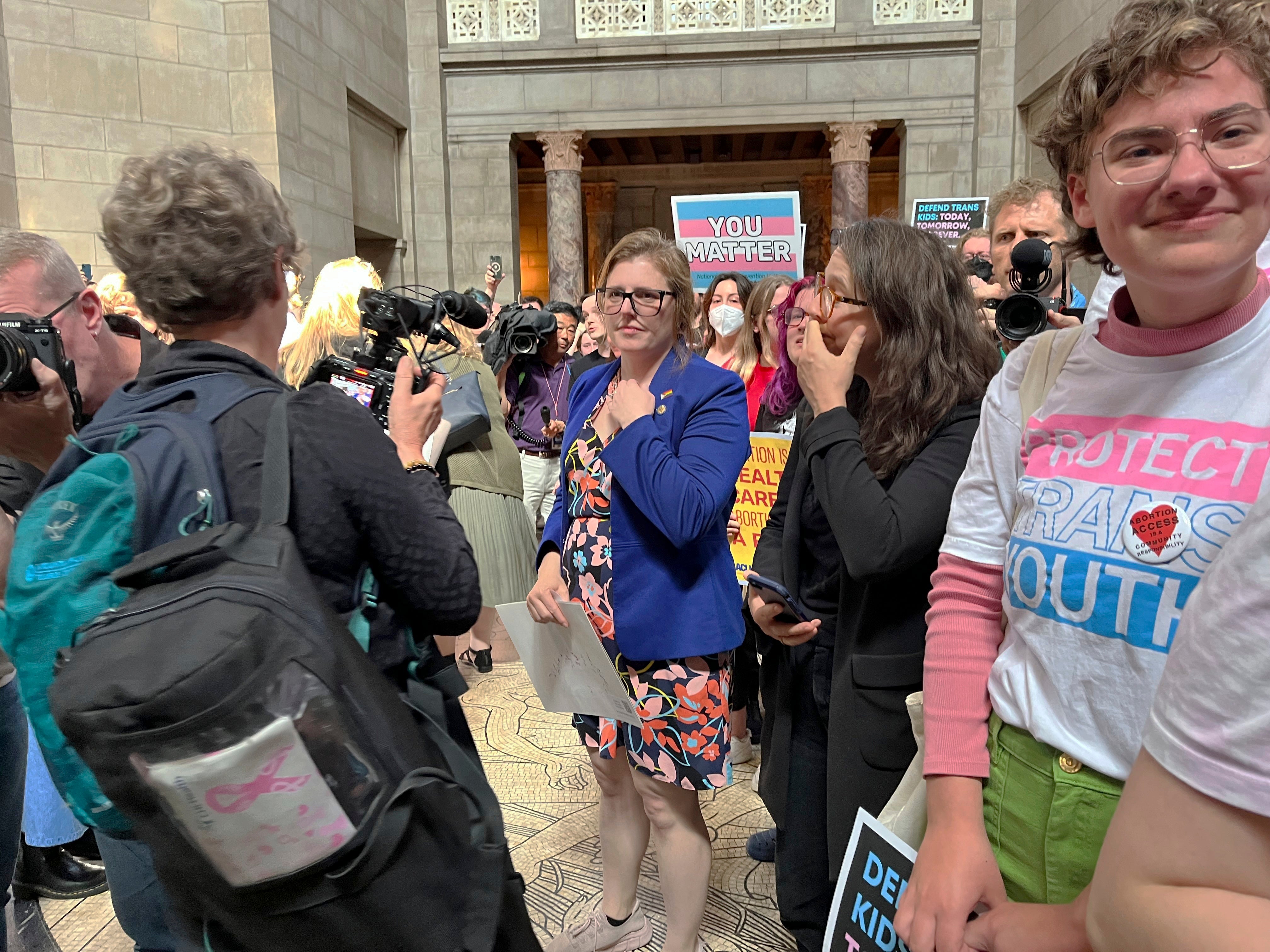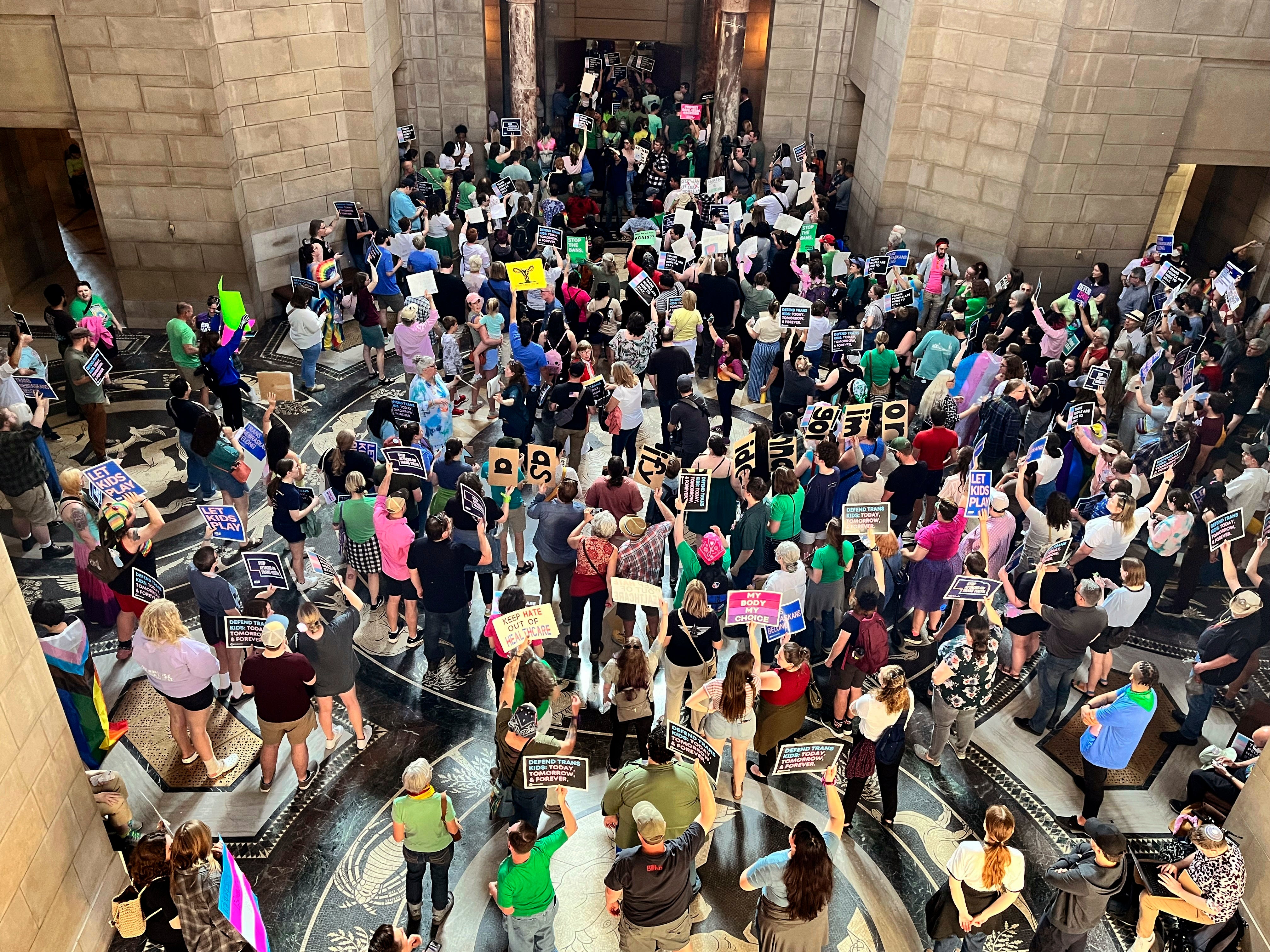Lizzo blasts Nebraska bill banning abortion access and gender-affirming care: ‘You deserve to be protected’
Opponents ‘actively exploring’ legal options after lawmakers pass restrictive legislation following months-long filibuster
After an epic filibuster that blocked legislation for nearly three months, state lawmakers in Nebraska approved a Republican-led ban on abortion care at roughly 10 weeks of pregnancy, combined with a bill that bans gender-affirming care for transgender youth.
The extraordinary maneuvers in the smallest legislative body in the country have drawn national attention, as lawmakers across the United States take up a wave of bills targeting abortion rights and LGBT+ people.
Protesters surrounded the state capitol chambers in Lincoln on 19 May chanting “keep your bans off our bodies” and “save our lives” as lawmakers made their final round of votes on the bill, which now heads to the desk of Republican Governor Jim Pillen, who intends to sign it into law. At least six protesters were arrested.
At a show in Nebraska hours after the vote on Friday night, the artist Lizzo lambasted the legislation from the stage. “It really breaks my heart that there are young people growing up in a world that doesn’t protect them,” she said.
“Don’t let anyone tell you who you are. ... These laws are not real. You are what’s real, and you deserve to be protected.”
LGBT+ advocates and abortion rights groups have also signalled they are prepared to sue the state to block the measure once it is signed into law.
“To be clear, we refuse to accept this as our new normal,” according to a statement from ACLU of Nebraska interim director Mindy Rush Chipman. “This vote will not be the final word. We are actively exploring our options to address the harm of this extreme legislation, and that work will have our team’s full focus. This is not over, not by a long shot.”
The legislation directs the state’s chief medical officer – appointed by the Republican governor – to draft the rules for how young trans people and their families can access nonsurgical affirming healthcare.
It also bans abortion at 12 weeks gestational age, or roughly nine or 10 weeks, from fertilization.
The bill’s passage comes roughly three months after a group of LGBT+ and abortion rights-supporting lawmakers launched a filibuster to block any legislation from advancing in the state’s unicameral legislature until a measure banning gender-affirming care was withdrawn, or until time ran out in the 90-day session.
Last month, the filibuster successfully blocked a measure from anti-abortion lawmakers to ban abortion at roughly six weeks of pregnancy. Attaching another anti-abortion measure to the gender-affirming care ban gave proponents of the bill a second chance of advancing both.
Opponents forcefully opposed the inclusion of an abortion ban in a bill targeting gender-affirming care, two wholly separate issues combined into one, “but you all don’t care”, state Sen. Machaela Cavanaugh, who launched the filibuster effort in February, told lawmakers this week.
“I wish the people in here cared about what they’re doing to people, but they don’t,” she said during debate. “Why are you doing this to our kids? Why are you doing this to our doctors? … Please stop.”
State Sen. Megan Hunt, the first openly LGBT+ person elected to the state’s legislature, lambasted a Republican colleague who complained that she was missing her grandson graduate from preschool so she could vote on the bill.
Ms Hunt, who changed her party affiliation from Democratic to Independent during this legislative session, also is the mother of a 12-year-old trans son.
“If you want to see your grandson graduate from preschool, you should do that,” Ms Hunt told Republican state Sen Lou Ann Linehan.
“Instead, you are here to drag out this session because you won’t come off this bill that hurts my son,” she said on 18 May. “You hate him more than you love your own family. And that’s why you’re here. … I am not asking you to sit here through late nights to vote on these bills that we’re dragging out. I’m asking you to love your family more than you hate mine.”

She also eviscerated another lawmaker, state Sen. Ray Aguilar, who took issue with being labelled anti-LGBT+ because he said he has a gay daughter. Mr Aguilar voted in favour of the legislation.
“You’re part of the problem, that is the scourge of hate and discrimination that your party is standing on in the middle of an ocean like it’s the most important thing in the world to them,” Ms Hunt said. “Your proximity to gayness does not make that OK.”
More than a dozen states, mostly in the South, have severely restricted or effectively outlawed abortion in the year after the US Supreme Court struck down Roe v Wade, which affirmed a constitutional right to abortion access.
In this past week, lawmakers in North Carolina and South Carolina approved abortion bans, extending restrictions on abortion care from Texas and Oklahaoma through the entire Gulf Coast and throughout the southeast.
Nebraska’s legislation also joins a nationwide campaign that has seen hundreds of bills aimed at LGBT+ people, particularly at young trans people, filed in nearly every state within the last two years.

At least 15 states have enacted laws or policies banning gender-affirming care for young trans people, and more than a dozen others are considering similar measures. Court injunctions have blocked bans from going into effect in three states.
More than half of all trans youth in the US between the ages of 13 and 17 are at risk of losing access to what major health organisations consider age-appropriate, medically necessary and potentially life-saving affirming healthcare in their home state, according to the Human Rights Campaign.
The onslaught of legislation and volatile political debate surrounding the bills have also negatively impacted the mental health of an overwhelming majority of young trans and nonbinary people, according to polling from The Trevor Project and Morning Consult. A separate survey from The Trevor Project found that 41 per cent of trans and nonbinary youth have seriously considered attempting suicide over the last year.
If you are based in the US and seek LGBT+ affirming mental health support, resources are available from Trans Lifeline (877-565-8860) and the LGBT Hotline (888-843-4564), as well as The Trevor Project (866-488-7386 or text START to 678-678).
If you are experiencing feelings of distress, or are struggling to cope, you can speak to the Samaritans, in confidence, on 116 123 (UK and ROI), email jo@samaritans.org, or visit the Samaritans website to find details of your nearest branch.
If you are based in the US, and you or someone you know needs mental health assistance right now, call or text the 988 Suicide & Crisis Lifeline at 988. This is a free, confidential crisis hotline that is available to everyone 24 hours a day, seven days a week.
If you are in another country, you can go to www.befrienders.org to find a helpline near you.
Join our commenting forum
Join thought-provoking conversations, follow other Independent readers and see their replies
Comments



Bookmark popover
Removed from bookmarks